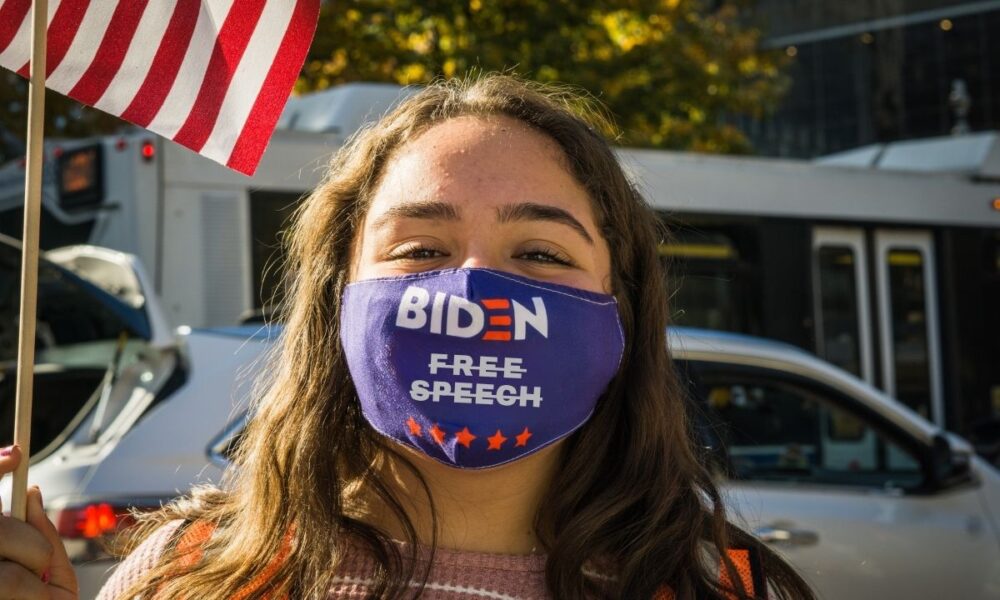Former President Joe Biden warned of “dark days” in America, accusing President Donald Trump of attacking free speech while neglecting his own questionable record on the matter.
Speaking Sunday night in Boston after receiving the Lifetime Achievement Award from the Edward M. Kennedy Institute, Biden urged Americans to stay optimistic despite what he described as attacks on the free speech of government employees, universities, and comedians by the current administration.
“The late-night hosts continue to shine a light on free speech, knowing their careers are on the line,” Biden said, per PBS. “Friends, I can’t sugarcoat any of this. These are dark days.”
“Since its founding, America served as a beacon for the most powerful idea ever in government in the history of the world,” Biden added. “The idea is stronger than any army. We’re more powerful than any dictator.”
Biden, 82, appeared in public for the first time since completing radiation therapy for an aggressive form of prostate cancer.
Biden predicted that America would “find our true compass again” and emerge “stronger, wiser and more resilient, more just, so long as we keep the faith.”
Yet, Biden’s comments are at odds with his former administration’s handling of speech.
In August 2024, Meta CEO Mark Zuckerberg admitted in a letter to Congress that Facebook had been “repeatedly pressured” by senior Biden administration officials to suppress posts about COVID-19, including “humor and satire.”
Zuckerberg wrote that he believed “the government pressure was wrong” and that Facebook should have been “more outspoken about it,” The Dallas Express reported at the time.
The admission confirmed what internal documents and discovery in Murthy v. Biden — formerly Missouri v. Biden — had already suggested: that federal agencies, including the White House, the Centers for Disease Control and Prevention, and the FBI, had held regular meetings with major social media companies about controlling so-called misinformation. These meetings often targeted critics of the President’s policies or perceived political enemies.
“From behind the scenes, various government officials from the Biden administration pressured, cajoled, and intimidated social media platforms into censoring speech and particular speakers that the officials didn’t like,” according to the Foundation for Individual Rights and Expression (FIRE), which filed a friend-of-the-court brief in the case.
The Fifth Circuit Court of Appeals ruled, “Ultimately, we find the district court did not err in determining that several officials — namely the White House, the Surgeon General, the CDC, and the FBI — likely coerced or significantly encouraged social-media platforms to moderate content, rendering those decisions state actions. In doing so, the officials likely violated the First Amendment.”
However, the Supreme Court later declined to decide whether the pressure itself violated the Constitution, ruling instead that the plaintiffs — two states and several individuals — lacked standing to bring the case.
A FIRE case overview described the conduct as “jawboning,” a term for informal government coercion of private companies to suppress disfavored speech. The organization’s release warned that both Democratic and Republican administrations had engaged in similar behavior, though the Biden-era cases revealed an unprecedented level of coordination between federal officials and tech platforms.
Although the Supreme Court stopped short of declaring such pressure unconstitutional, FIRE and other watchdogs have called on Congress to enact new transparency rules, including the proposed Social Media Administrative Reporting Transparency Act, or “SMART” Act, which would require the government to disclose communications with tech companies about content moderation.
Biden’s comments were predicated on a recent media firestorm surrounding late-night host Jimmy Kimmel.
Federal Communications Commission Chairman Brendan Carr came under scrutiny for comments about comedian Jimmy Kimmel after he appeared to threaten sanctions against ABC and Disney if the network failed to punish Kimmel for remarks about the assassination of Charlie Kirk.
Carr later claimed that his words were “misrepresented” by the media and said that broadcasters had merely made “business” decisions to suspend Kimmel, The Dallas Express reported.
Kimmel had been pulled from the air for several days after joking that the man who shot Kirk was part of the “MAGA gang.” When Kimmel returned to television in late September, he reportedly declined to apologize but said it was “never my intention to make light of the murder of a young man.”


